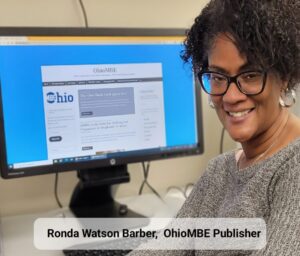We Must Vote to Protect What 20 Black Laundresses Gave Us
By Marilyn Brown
OhioMBE – August 15, 2014
“Today, there are people trying to take away rights that our mothers, grandmothers, and great-grandmothers fought for: our right to vote, our right to choose, affordable quality education, equal pay, access to health care. We the people can’t let that happen.” These words, spoken by the actress Kerry Washington, remind us that we can never stop being vigilant regarding equality fair voting, and workers’ rights.
The struggle is not new.
In the steamy hot summer of 1881, less than two decades after the end of slavery, 20 Black laundresses in Atlanta gathered to form an association. They called themselves the Washing Society, and they demanded fair rates for their labor and autonomy over their work environment. They were tired of making pennies, and demanded $1 per dozen pounds of washing – an unheard-of $12-$18 per week. They worked just as hard as men in who were laborers and machinists who were averaging $8.10-13.62 per week, and they demanded their due. They garnered support of the Black ministers and went door-to-door with their message, signing up over 3,000 members in three weeks.
The (mostly white, mostly male) establishment was none too pleased at these “uppity washing Amazons” as they called them, and proposed charging each laundress a $25 licensing fee. The ladies called the bluff, writing, “We are determined to stand to our pledge and make extra charges for washing, … and are willing to pay $25 or even $50 for licenses … We will do it before we will be defeated, and then we will have full control of the city’s washing at our own prices, as the city has control of our husbands’ work at their prices. We mean business … or no washing. Yours respectfully.”
The establishment blinked first, with the Atlanta city council deciding on August 16, 1881, to reject the need for licensing, and the Washing Society had won. This strike and this stand did not only raise and level wages, it established Black women workers as an important and influential part of the economy of the New South. It was a fight toward equal pay and respect, and for the right to unionize. [1]
Fast forward 123 years.
Equal pay is still not a reality.
In 2007, the Supreme Court of the United States (SCOTUS) swept aside the complaints of a woman, Lilly Ledbetter, who had found out that she had faced gender-based pay discrimination for decades. Too late, they said, and too bad. Thankfully, Congress reversed this action by passing the Ledbetter Fair Pay Act of 2009, reinstating employees’ right to have their day in court, but not ensuring wage fairness. Still today, women employed within the three central Ohio Congressional districts face a wage gap, making 81¢ to every $1 earned by their male counterparts. [2]
Fair voting is still not a guarantee.
Only a year ago, SCOTUS rendered the Voting Rights Act of 1965 completely toothless with the June 25, 2013 decision in Shelby County v Holder. Jurisdictions with a history of and propensity toward discriminatory voting regulations are no longer regulated, and free to enact voting requirements without pre-clearance of the US Department of Justice. The fallout is already measurable. Emboldened by this decision, the Texas legislature has changed their voter identification requirements – now a student identification card is not accepted as a valid voting ID, but a concealed handgun license is. [3]
Worker’s rights are still not secure.
Recently, we have seen SCOTUS deal a blow to labor unions with the June 30, 2014 decision in Harris v Quinn. Bill Fletcher, Jr., an activist and syndicated columnist, summed up this decision by saying, “What is clear is that the Supreme Court’s conservative majority has a sniper’s scope trained on workers and unions.” Never in our nation’s history has the polarization of wealth been so great, and never in our nation’s history has organized labor been so important to ensuring the physical and financial health of the American workforce. [4] Harris v Quinn has opened the door to creating a “Right to Work” nation.
Voting matters. So how do we fight back? How do we ensure that these rights, and many others, that have been made possible by the blood, sweat, and tears of the Washing Society and so many others are protected and expanded? One word: VOTE.
Vote for public officials who are going to stand for expanding rights, not taking them away. Vote for a president who will appoint Supreme Court justices who have that same philosophy. Vote for judges who know the law is meant to protect, not to bludgeon. Vote for mayors, city council members, school board members, township trustees, county commissioners, state representatives and senators, governors, and statewide officials who are committed to these fundamental rights. Vote for sheriffs who acknowledge that arrest and incarceration patterns are the new Jim Crow, and who pledge to change that in their jurisdictions. Vote for auditors and treasurers who are committed to fair and affordable housing and who value neighborhood renovation as much as they do new development. Vote for coroners who are tired of seeing young Black men senselessly pile up on their slabs and who will take preemptive action.
There are no unimportant elections. Many in our history have fought for freedom, emancipation, and equality. We must not dishonor them, ourselves, and our future generations by letting these precious gifts be jeopardized.
Stand up.
VOTE!
Marilyn Brown is President of the Franklin County Board of Commissioners.
Sources:
[1] Tera Hunter, To ‘Joy My Freedom, Southern Black Women’s Lives and Labors After the Civil War, Harvard Press, 1997, pp 88-94.
[2] American Association of University Women, http://www.aauw.org/research/the-simple-truth-about-the-gender-pay-gap/
[3] Texas Secretary of State, http://votetexas.gov/register-to-vote/need-id/
[4] BlackPressUSA/National Newspaper Publishers Association, http://www.blackpressusa.com/2014/07/supreme-court-seeks-to-gut-labor-unions/#sthash.VFFfjZDc.dpbs; Bill Fletcher Jr, http://billfletcherjr.com/
Image credit: The Laundress, Robert Henri, 1916. Painting, oil on canvas. Phoenix Art Museum.
